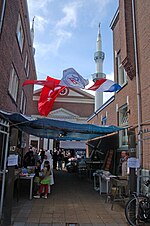Nieuwe Kerk (The Hague)
Baroque architecture in the NetherlandsBaroque church buildingsBuildings of the Dutch Golden AgeChurches in The HagueNetherlandish Baroque art ... and 4 more
Octagonal churchesProtestant churches in the NetherlandsReligious buildings and structures completed in 1656Rijksmonuments in The Hague

The Nieuwe Kerk (Dutch pronunciation: [ˈniʋə ˈkɛr(ə)k]; English: New Church) is a Dutch Baroque Protestant church in The Hague, located across from the modern city hall on the Spui. It was built in 1649 after the Great Church had become too small. Construction was completed in 1656.
Excerpt from the Wikipedia article Nieuwe Kerk (The Hague) (License: CC BY-SA 3.0, Authors, Images).Nieuwe Kerk (The Hague)
Gedempte Gracht, The Hague Centrum
Geographical coordinates (GPS) Address Nearby Places Show on map
Geographical coordinates (GPS)
| Latitude | Longitude |
|---|---|
| N 52.076388888889 ° | E 4.315 ° |
Address
Gedempte Gracht 405D
2512 AM The Hague, Centrum
South Holland, Netherlands
Open on Google Maps









